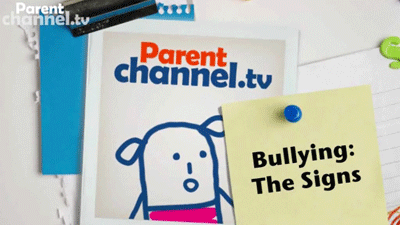 Go to main content
Go to main content
Archive Website of the UK government
Please note that this website has a UK government accesskeys system.
Main menu
Page menu
Video: signs that your 5 to 9 year old is being bullied
What you should look out for if you're worried your child is being bullied.
Can't see the video?

To play this video you need Adobe Flash Player version 9 or higher on your computer and have JavaScript enabled on your browser. Our Help with video files page gives advice if you are unsure how to do this. The Flash software is free.
Text version
Boy: "I got kicked, pinched, punched, bitten, verbally abused..."
Younger woman: "When I was bullied at primary school, it was a not very obvious type of bullying - it was just where I was being excluded. One of the incidents I remember was where I'd gone up to a group of people I thought were my friends and joined in the conversation, and one of the girls turned to me and said 'Why are you here?' and I said 'What do you mean, why I am here?', and she said 'Don't stand here - you're not welcome'."
Eileen Hayes, parenting advisor: "If you're a parent and you find out your small child's being bullied you're just devastated. We all want our children to be popular and have friends, and the fact that somebody else might not like them is devastating to parents."
As a parent, how might you feel?
Mother: "I felt sick. I felt guilty. I felt like I'd lost control of looking after my child."
Girl: "If your child was being bullied, how would you know?"
Sarah Dyer, Beatbullying: "If parents suspect their younger children are being bullied, the most obvious thing to look out for is mood changes. Often kids that are being bullied get withdrawn, they get upset, they might be saying that they're feeling sick and they don't want to go to school. They change their moods so you'll notice as a parent if something's up with them."
Claude Knights, Kidscape: "One of the first signs might be that your child is not behaving in ways which are average and normal for them. So if your child is outgoing and suddenly becomes quite introverted, or perhaps their eating habits are different...it's really about knowing your child and why he or she would suddenly act very differently."
Sarah Dyer: "Other things you can look out for are torn clothing when they come home from school, or if something like their pencil case or a bag goes missing, or something gets scuffed or damaged in some way - often those are indicators that something's going on for them at school."
Note any changes in usual behaviour
Claude Knights: "Is the child attempting to cover up - is an eight year old suddenly locking the bathroom door [as if] they don't want you to see their arms or legs, are they hiding bruises? They will work hard to hide the fact that it's happening."
Eileen Hayes: "Small children blame themselves a lot for things that happen to them so they quite often think it's their fault, that the bully has picked on them because there's something wrong with them - and actually that's not true.
Mother: "One evening I caught Connor at the top of the stairs with tears in his eyes and I just sat with him and said to him 'What's going on at school?'. He told me that a boy had been threatening him, calling him names, telling him what he was going to do to him outside school...and then I was so glad he told me - I put my arms around him and told him that I would help him."
Listen carefully to your child
Claude Knights: "One of the main things is for a parent to listen to their child and not to be immediately talking at them - almost leaking one's pain so it becomes about you and not the child - believing them, absolutely believing them, because many victims of abuse generally fear not being believed. And also letting them know that there will be solutions - the family, the school and other adults that perhaps need to be involved will work together to solve the problem."
Useful tips:
- watch your child and listen carefully
- believe your child
- get appropriate help